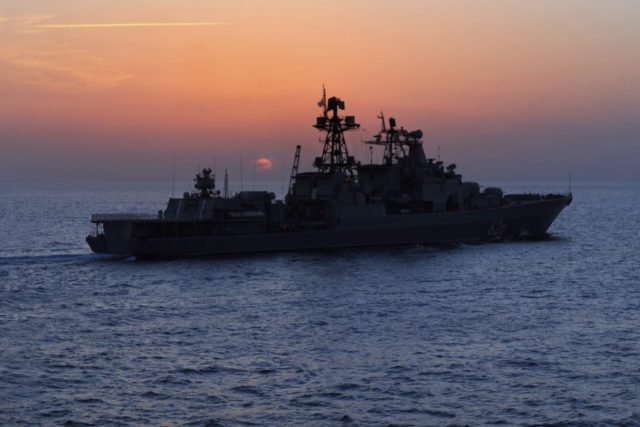WASHINGTON, DC — The top U.S. commander in Europe on Tuesday declared that American and NATO troops could not yet mount a credible deterrence against Russian aggression, noting that the Kremlin’s efforts to modernize its armed forces are eroding the United Sates’s military advantage in Europe.
Gen. Curtis Scaparrotti, the U.S. European Command (EUCOM) head and NATO’s supreme allied commander, identified a lack of manpower, naval capability shortfalls, and inadequate intelligence surveillance and reconnaissance (ISR) capacity as reasons why American and NATO troops are unable to handle the credible deterrence against Russian aggression.
The general’s comments came as he testified before the Senate Armed Services Committee about American military activities in Europe, telling lawmakers the United States needs to follow in the footsteps of American rival Russia and modernize its force.
Scaparrotti proclaimed:
The threats facing U.S. interest in the EUCOM area of responsibility, which includes Israel, are real and growing. They are complex, trans-regional, all-domain and multifunctional. This remains one of the most dynamic periods in recent history, in my view. Russia has continued its reemergence as a strategic competitor and remains the primary threat to a stable Euro-Atlantic security environment. While the United States maintains a global military superiority over Russia, evolving Russian capabilities threaten to erode our competitive military advantage, challenge our ability to operate uncontested in all domains and diminish our ability to deter Russian aggression.
U.S. President Donald Trump’s National Defense Strategy prioritizes combating America’s top strategic competitors Russia and China over the war on terror.
Asked whether or not EUCOM has the proper posture and capabilities to deter Russian aggression in Europe, Gen. Scaparrotti replied:
We’ve added forces and capabilities. We’ve improved the readiness. But I would tell you in response to your question that I’m not comfortable yet with the deterrent posture that we have in Europe in support of the National Defense Strategy.
Refusing to elaborate further in a public setting, the American commander only hihlighted “shortfalls in our land component and the depth of forces” in Europe.
“Finally of concern is my intelligence surveillance and reconnaissance capacity given that increasing and growing threat of Russia. I need more ISR and again in the closed hearing I can go into detail,” he added.
Citing “Russia’s modernizing increasingly aggressive force posture,” Gen. Scaparrotti called for “augmenting” EUCOM’s “assigned and rotational forces to enhance our deterrence posture.”
“EUCOM also recommends further investments that enhance European logistical infrastructure and capacity to support rapid deployment and multi-domain U.S. forces in Europe,” the general continued.
According to Scaparrotti, the United States military needs to modernize its naval capabilities and strengthen its capacity if it wants “to remain dominant in the maritime domain, and particularly undersea.”
Scaparrotti revealed that he had requested two more naval destroyers for EUCOM.
“We do need greater capacity, particularly given the modernization and the growth of the fleets, the Russian fleets in Europe,” the general declared, without elaborating further in a public setting.
“I would like to see, or at least, the rotation of naval component, carrier strike groups, amphibious strike groups, at a little better pace than I’ve seen in the three years that I’ve been in command,” he noted.
The U.S. general indicated that more American lethal aid is coming for anti-Russia forces in Ukraine.
“There are other systems, snipers systems, ammunition, and perhaps looking at the Kerch Straits perhaps [a] consideration for naval systems as well here in the future as we move forward,” he told lawmakers.
Since 2014, Russia-backed militants and the Ukrainian military have been fighting a war that has killed up to 13,000 people and wounded at least 27,000 others, according to the United Nations.

COMMENTS
Please let us know if you're having issues with commenting.